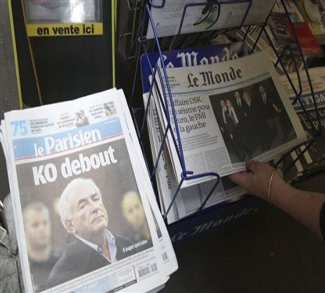Global markets stand on the precipice of another plunge into the now familiar territory of red and recession, though this time there won’t be the prospect of government stimulus spending to soften the blow.
As Asian markets plummet in resigned anticipation of how Wall Street will open this Monday, we find ourselves once more considering the prospect of global economic crisis- the second round of the much-discussed double dip recession. In a market that seems increasingly detached from economic realities, Standard & Poor’s downgrading of US debt to AA+ will be seized upon as a convincing symbol of economic doom, triggering a sell-off that will surely reverberate around global markets over the next few weeks.
Policy deadlock, tepid economic recovery, and sovereign debt issues in the US, spreading rot in the euro sovereign debt crisis, and rising inflation in China; all of these stand as grim reminders that the Great Recession could well end up a two-step process. Compounding the fear is the fact that government stimulus spending has effectively been eliminated as a policy option in many Western countries due to the fiscal squeeze brought on by previous bouts of post-2008 bailout spending.
Thus, if the global economy does plunge into the Great Recession’s second dip, there’s reason to believe it could very well be more painful than the first.
There is however still some cause for optimism. For one, there’s the nature of what’s spooked global investors. Even though Standard & Poor’s decision represents a turning point, it is merely symbolic and nothing more. In other words, nothing economically substantive has occurred. There has been no release of terrible economic data, no grinding to a halt of inter-bank lending. Rather, an influential rating agency has released its own in-house evaluation and nothing more. Moreover, far from a revelation, it’s a conclusion that most people would logically arrive at after sifting through a few CBO budget projections and observing the current political climate in Washington. Indeed, articles on the Geopoliticalmonitor have been invoking the possibility of a US sovereign debt crunch for over a year.
Thus, global markets may hold their ground if they’re given an equally symbolic gesture that can be chalked up in the optimism column. This is no doubt why G7 leaders got together to deliberate over the weekend, eventually generating the somewhat anti-climactic declaration that they were, “determined to react in a co-ordinated manner.”
Another positive note is the greater potential for decisive action in tackling the euro zone crisis. In the wake of emergency meetings over the weekend, the European Central Bank (ECB) announced that it will begin buying up eurozone bonds. The statement did not stipulate which bonds exactly, but it is widely understood to mean that the ECB is going to extend its buying program beyond Ireland, Greece, and Portugal to now include Spain and Italy. This will sooth investor fears over the short term, and it brings Chancellor Merkel one step closer to having to decide between saving the euro zone and saving her own domestic political career.
The next few weeks will be critical in determining the direction that the global economy will take over the short to medium term. Now, pressure will fall on Europe to take decisive measures and nervous eyes will fall on the economies of the United States and China- the former for signs that it is falling back into recession, and the latter for any indication that robust growth is coming to an end. What’s certain is that we can expect steep drops in global stock markets over the course of this week. The real question is: how steep is steep?




